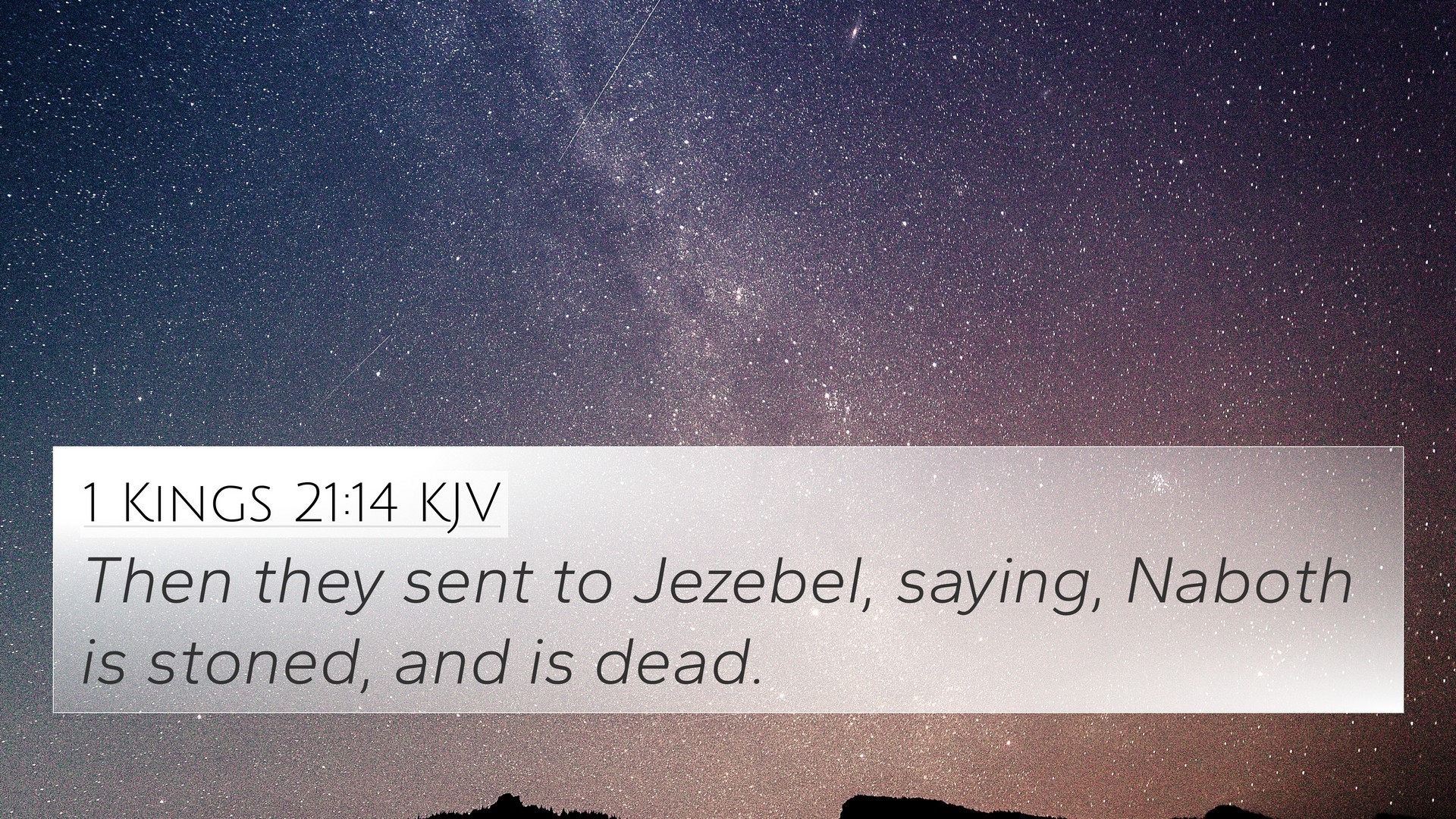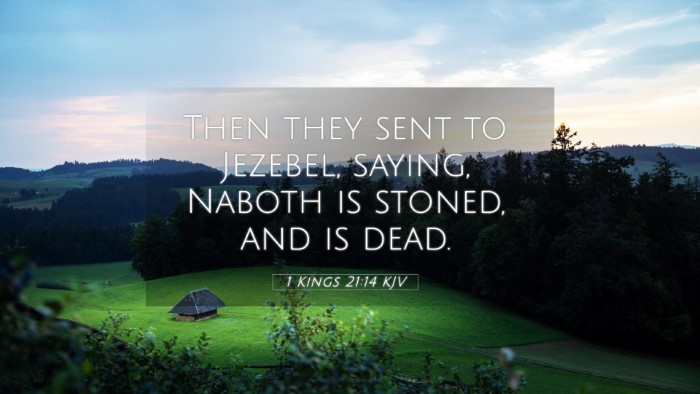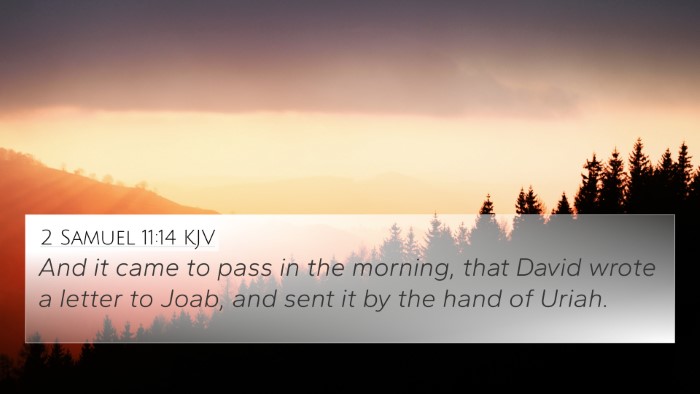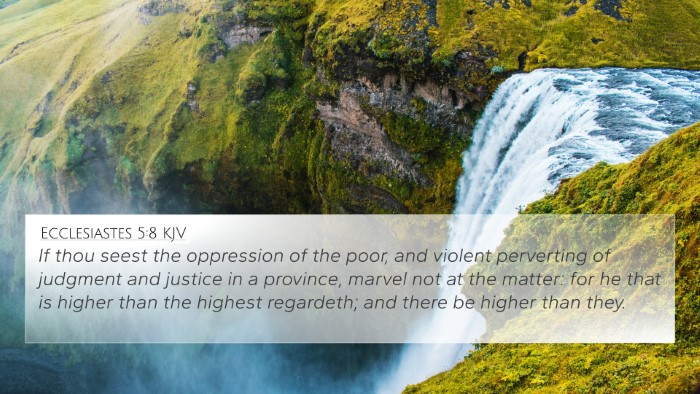Understanding 1 Kings 21:14
This verse reads: "Then they sent to Jezebel, saying, 'Naboth is stoned and is dead.'" (1 Kings 21:14, ESV). The context of this verse emphasizes the lengths to which Jezebel would go to satisfy King Ahab's desires, particularly concerning Naboth's vineyard.
Commentary Insights
Matthew Henry's Commentary
Henry notes the cruel and manipulative nature of Jezebel's actions, illustrating that she orchestrated Naboth's death through deception and falsehood. Her disregard for justice and righteousness exemplifies the corruption of leadership when driven by greed. This act is a reminder of how the wicked can conspire to achieve their desires, influencing the moral fabric of society deeply.
Albert Barnes' Notes
Barnes elaborates on the significance of the events leading up to this moment. He points to the premeditated plot that involved false witnesses, highlighting the moral decay and the prevalence of perjury to accomplish Jezebel's ambitions. This underscores a critical view of governance and the erosion of communal ethics.
Adam Clarke's Commentary
Clarke focuses on the implications of Naboth's stoning and its impact on the social justice system of Israel. He emphasizes that the systemic injustice perpetrated by those in power sets a dangerous precedent for society. Clarke also provides a stark reminder about man's accountability to God, indicating that despite the apparent success of Jezebel's plot, divine judgment awaited.
Thematic Connections and Cross-References
The themes of justice, corruption, and divine accountability in 1 Kings 21:14 resonate throughout the Bible. Here are significant cross-references that reflect these themes:
- Exodus 20:16: "You shall not bear false witness against your neighbor." This commandment highlights the gravity of false accusations, which were weaponized against Naboth.
- 2 Kings 9:7: "And you shall strike down the house of Ahab your master, so that I may avenge on Jezebel the blood of my servants the prophets, and the blood of all the servants of the Lord." This shows God's forthcoming judgment on Ahab and Jezebel for their sins.
- Micah 6:10-12: "Can I forget any longer the treasures of wickedness in the house of the wicked, and the scant measure that is accursed?" A reflection on the unjust practices emerging from greed.
- Lamentations 3:34: "The Lord does not see injustice done to men in the courts?" This emphasizes God’s attention to moral failures in leadership.
- Matthew 23:37: "O Jerusalem, Jerusalem, the city that kills the prophets and stones those who are sent to it!" This recalls the ongoing theme of persecution of God's messengers throughout biblical history.
- James 5:6: "You have condemned and murdered the righteous person. He does not resist you." This connects to the injustices carried out by the powerful against the innocent.
- 1 Peter 2:12: "Keep your conduct among the Gentiles honorable, so that when they speak against you as evildoers, they may see your good deeds and glorify God." This verse speaks to the importance of maintaining integrity in the face of systemic corruption.
Comparative Study and Inter-Biblical Dialogue
The actions in 1 Kings 21:14 hold profound implications when studied alongside other scriptures that discuss the themes of integrity, justice, and divine retribution. By analyzing these verses, one may identify a consistent biblical pattern advocating for righteousness and the pitfalls of corruption.
Tools for Bible Cross-Referencing
Engaging with the Bible through cross-referencing enhances understanding. Here are some tools and methods:
- Bible Concordance: A rich resource for locating verses and understanding their context.
- Bible Cross-Reference Guide: Useful for linking themes between different scriptures.
- Cross-Reference Bible Study: Implement methods for analyzing how verses correspond to one another.
Conclusion
The events surrounding Naboth's unjust execution reveal critical lessons about morality, justice, and the consequences of corrupt leadership. 1 Kings 21:14 serves as a reminder of the importance of integrity and the inevitable accountability one faces before God. Utilization of tools for biblical cross-referencing can further deepen one’s understanding of these themes as they appear across scripture.





